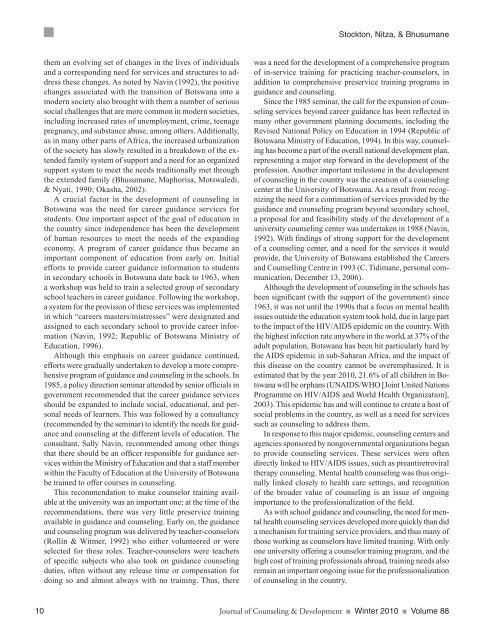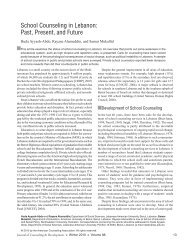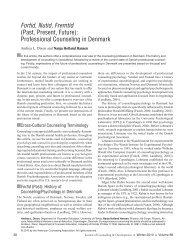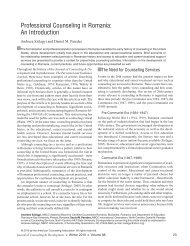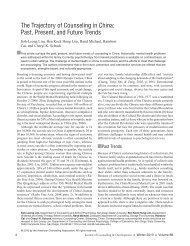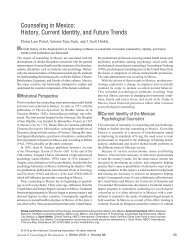The Development of Professional Counseling in Botswana - IRCEP
The Development of Professional Counseling in Botswana - IRCEP
The Development of Professional Counseling in Botswana - IRCEP
Create successful ePaper yourself
Turn your PDF publications into a flip-book with our unique Google optimized e-Paper software.
Stockton, Nitza, & Bhusumane<br />
them an evolv<strong>in</strong>g set <strong>of</strong> changes <strong>in</strong> the lives <strong>of</strong> <strong>in</strong>dividuals<br />
and a correspond<strong>in</strong>g need for services and structures to address<br />
these changes. As noted by Nav<strong>in</strong> (1992), the positive<br />
changes associated with the transition <strong>of</strong> <strong>Botswana</strong> <strong>in</strong>to a<br />
modern society also brought with them a number <strong>of</strong> serious<br />
social challenges that are more common <strong>in</strong> modern societies,<br />
<strong>in</strong>clud<strong>in</strong>g <strong>in</strong>creased rates <strong>of</strong> unemployment, crime, teenage<br />
pregnancy, and substance abuse, among others. Additionally,<br />
as <strong>in</strong> many other parts <strong>of</strong> Africa, the <strong>in</strong>creased urbanization<br />
<strong>of</strong> the society has slowly resulted <strong>in</strong> a breakdown <strong>of</strong> the extended<br />
family system <strong>of</strong> support and a need for an organized<br />
support system to meet the needs traditionally met through<br />
the extended family (Bhusumane, Maphorisa, Motswaledi,<br />
& Nyati, 1990; Okasha, 2002).<br />
A crucial factor <strong>in</strong> the development <strong>of</strong> counsel<strong>in</strong>g <strong>in</strong><br />
<strong>Botswana</strong> was the need for career guidance services for<br />
students. One important aspect <strong>of</strong> the goal <strong>of</strong> education <strong>in</strong><br />
the country s<strong>in</strong>ce <strong>in</strong>dependence has been the development<br />
<strong>of</strong> human resources to meet the needs <strong>of</strong> the expand<strong>in</strong>g<br />
economy. A program <strong>of</strong> career guidance thus became an<br />
important component <strong>of</strong> education from early on. Initial<br />
efforts to provide career guidance <strong>in</strong>formation to students<br />
<strong>in</strong> secondary schools <strong>in</strong> <strong>Botswana</strong> date back to 1963, when<br />
a workshop was held to tra<strong>in</strong> a selected group <strong>of</strong> secondary<br />
school teachers <strong>in</strong> career guidance. Follow<strong>in</strong>g the workshop,<br />
a system for the provision <strong>of</strong> these services was implemented<br />
<strong>in</strong> which “careers masters/mistresses” were designated and<br />
assigned to each secondary school to provide career <strong>in</strong>formation<br />
(Nav<strong>in</strong>, 1992; Republic <strong>of</strong> <strong>Botswana</strong> M<strong>in</strong>istry <strong>of</strong><br />
Education, 1996).<br />
Although this emphasis on career guidance cont<strong>in</strong>ued,<br />
efforts were gradually undertaken to develop a more comprehensive<br />
program <strong>of</strong> guidance and counsel<strong>in</strong>g <strong>in</strong> the schools. In<br />
1985, a policy direction sem<strong>in</strong>ar attended by senior <strong>of</strong>ficials <strong>in</strong><br />
government recommended that the career guidance services<br />
should be expanded to <strong>in</strong>clude social, educational, and personal<br />
needs <strong>of</strong> learners. This was followed by a consultancy<br />
(recommended by the sem<strong>in</strong>ar) to identify the needs for guidance<br />
and counsel<strong>in</strong>g at the different levels <strong>of</strong> education. <strong>The</strong><br />
consultant, Sally Nav<strong>in</strong>, recommended among other th<strong>in</strong>gs<br />
that there should be an <strong>of</strong>ficer responsible for guidance services<br />
with<strong>in</strong> the M<strong>in</strong>istry <strong>of</strong> Education and that a staff member<br />
with<strong>in</strong> the Faculty <strong>of</strong> Education at the University <strong>of</strong> <strong>Botswana</strong><br />
be tra<strong>in</strong>ed to <strong>of</strong>fer courses <strong>in</strong> counsel<strong>in</strong>g.<br />
This recommendation to make counselor tra<strong>in</strong><strong>in</strong>g available<br />
at the university was an important one; at the time <strong>of</strong> the<br />
recommendations, there was very little preservice tra<strong>in</strong><strong>in</strong>g<br />
available <strong>in</strong> guidance and counsel<strong>in</strong>g. Early on, the guidance<br />
and counsel<strong>in</strong>g program was delivered by teacher-counselors<br />
(Roll<strong>in</strong> & Witmer, 1992) who either volunteered or were<br />
selected for these roles. Teacher-counselors were teachers<br />
<strong>of</strong> specific subjects who also took on guidance counsel<strong>in</strong>g<br />
duties, <strong>of</strong>ten without any release time or compensation for<br />
do<strong>in</strong>g so and almost always with no tra<strong>in</strong><strong>in</strong>g. Thus, there<br />
was a need for the development <strong>of</strong> a comprehensive program<br />
<strong>of</strong> <strong>in</strong>-service tra<strong>in</strong><strong>in</strong>g for practic<strong>in</strong>g teacher-counselors, <strong>in</strong><br />
addition to comprehensive preservice tra<strong>in</strong><strong>in</strong>g programs <strong>in</strong><br />
guidance and counsel<strong>in</strong>g.<br />
S<strong>in</strong>ce the 1985 sem<strong>in</strong>ar, the call for the expansion <strong>of</strong> counsel<strong>in</strong>g<br />
services beyond career guidance has been reflected <strong>in</strong><br />
many other government plann<strong>in</strong>g documents, <strong>in</strong>clud<strong>in</strong>g the<br />
Revised National Policy on Education <strong>in</strong> 1994 (Republic <strong>of</strong><br />
<strong>Botswana</strong> M<strong>in</strong>istry <strong>of</strong> Education, 1994). In this way, counsel<strong>in</strong>g<br />
has become a part <strong>of</strong> the overall national development plan,<br />
represent<strong>in</strong>g a major step forward <strong>in</strong> the development <strong>of</strong> the<br />
pr<strong>of</strong>ession. Another important milestone <strong>in</strong> the development<br />
<strong>of</strong> counsel<strong>in</strong>g <strong>in</strong> the country was the creation <strong>of</strong> a counsel<strong>in</strong>g<br />
center at the University <strong>of</strong> <strong>Botswana</strong>. As a result from recogniz<strong>in</strong>g<br />
the need for a cont<strong>in</strong>uation <strong>of</strong> services provided by the<br />
guidance and counsel<strong>in</strong>g program beyond secondary school,<br />
a proposal for and feasibility study <strong>of</strong> the development <strong>of</strong> a<br />
university counsel<strong>in</strong>g center was undertaken <strong>in</strong> 1988 (Nav<strong>in</strong>,<br />
1992). With f<strong>in</strong>d<strong>in</strong>gs <strong>of</strong> strong support for the development<br />
<strong>of</strong> a counsel<strong>in</strong>g center, and a need for the services it would<br />
provide, the University <strong>of</strong> <strong>Botswana</strong> established the Careers<br />
and Counsell<strong>in</strong>g Centre <strong>in</strong> 1993 (C. Tidimane, personal communication,<br />
December 13, 2006).<br />
Although the development <strong>of</strong> counsel<strong>in</strong>g <strong>in</strong> the schools has<br />
been significant (with the support <strong>of</strong> the government) s<strong>in</strong>ce<br />
1963, it was not until the 1990s that a focus on mental health<br />
issues outside the education system took hold, due <strong>in</strong> large part<br />
to the impact <strong>of</strong> the HIV/AIDS epidemic on the country. With<br />
the highest <strong>in</strong>fection rate anywhere <strong>in</strong> the world, at 37% <strong>of</strong> the<br />
adult population, <strong>Botswana</strong> has been hit particularly hard by<br />
the AIDS epidemic <strong>in</strong> sub-Saharan Africa, and the impact <strong>of</strong><br />
this disease on the country cannot be overemphasized. It is<br />
estimated that by the year 2010, 21.6% <strong>of</strong> all children <strong>in</strong> <strong>Botswana</strong><br />
will be orphans (UNAIDS/WHO [Jo<strong>in</strong>t United Nations<br />
Programme on HIV/AIDS and World Health Organization],<br />
2003). This epidemic has and will cont<strong>in</strong>ue to create a host <strong>of</strong><br />
social problems <strong>in</strong> the country, as well as a need for services<br />
such as counsel<strong>in</strong>g to address them.<br />
In response to this major epidemic, counsel<strong>in</strong>g centers and<br />
agencies sponsored by nongovernmental organizations began<br />
to provide counsel<strong>in</strong>g services. <strong>The</strong>se services were <strong>of</strong>ten<br />
directly l<strong>in</strong>ked to HIV/AIDS issues, such as preantiretroviral<br />
therapy counsel<strong>in</strong>g. Mental health counsel<strong>in</strong>g was thus orig<strong>in</strong>ally<br />
l<strong>in</strong>ked closely to health care sett<strong>in</strong>gs, and recognition<br />
<strong>of</strong> the broader value <strong>of</strong> counsel<strong>in</strong>g is an issue <strong>of</strong> ongo<strong>in</strong>g<br />
importance to the pr<strong>of</strong>essionalization <strong>of</strong> the field.<br />
As with school guidance and counsel<strong>in</strong>g, the need for mental<br />
health counsel<strong>in</strong>g services developed more quickly than did<br />
a mechanism for tra<strong>in</strong><strong>in</strong>g service providers, and thus many <strong>of</strong><br />
those work<strong>in</strong>g as counselors have limited tra<strong>in</strong><strong>in</strong>g. With only<br />
one university <strong>of</strong>fer<strong>in</strong>g a counselor tra<strong>in</strong><strong>in</strong>g program, and the<br />
high cost <strong>of</strong> tra<strong>in</strong><strong>in</strong>g pr<strong>of</strong>essionals abroad, tra<strong>in</strong><strong>in</strong>g needs also<br />
rema<strong>in</strong> an important ongo<strong>in</strong>g issue for the pr<strong>of</strong>essionalization<br />
<strong>of</strong> counsel<strong>in</strong>g <strong>in</strong> the country.<br />
10<br />
Journal <strong>of</strong> <strong>Counsel<strong>in</strong>g</strong> & <strong>Development</strong> ■ W<strong>in</strong>ter 2010 ■ Volume 88


